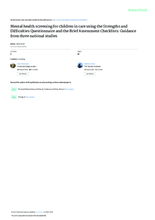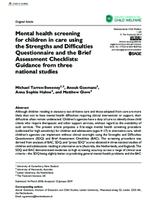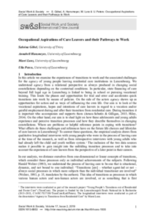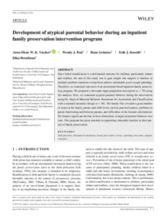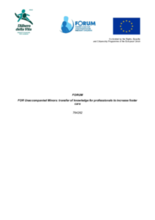

Displaying 161 - 170 of 424
"Belgian authorities have asked for DNA samples of children adopted from the Democratic Republic of Congo to establish if their biological parents are still alive," according to this article from BBC News.
This articles presents an analysis of 33 semi-structured interviews with foster families in Flanders, exploring the tensions between voluntaristic and professionalising tendencies in foster care.
The present article proposes a first-stage mental health screening procedure (calibrated for high sensitivity) for children and adolescents (ages 4–17) in alternative care, which children’s agencies can implement without clinical oversight using the Strengths and Difficulties Questionnaire (SDQ) and Brief Assessment Checklists (BAC).
The present article proposes a first-stage mental health screening procedure (calibrated for high sensitivity) for children and adolescents (ages 4–17) in alternative care, which children’s agencies can implement without clinical oversight using the Strengths and Difficulties Questionnaire (SDQ) and Brief Assessment Checklists (BAC).
The aim of this study was to investigate how workers within Child Protective Services (CPS) systems in Colorado and the Netherlands measure and perceive the effectiveness of their CPS system.
In this article, the authors examine the experiences of transitions to work and the associated challenges for the agency of young people leaving residential care institutions in Luxembourg.
Since failed reunification is a detrimental outcome for children, particularly infants and toddlers, the aim of this study was to gain insight into support to families in multiple-problem situations in the Netherlands to help them achieve sustainable good-enough parenting.
This article is written as part of the FORUM project (FOR Unaccompanied Minors: transfer of knowledge for professionals to increase foster care), an EU funded project which sought to enhance the capacity of professionals to provide quality foster care for unaccompanied migrant children, primarily through the transfer of knowledge. The article aims to contribute to this transfer of knowledge by bringing together literature which is of relevance to professionals developing or enhancing foster care services for unaccompanied migrant children.
This report from the German Youth Institute (Deutsches Jugendinstitut e.V., DJI) assesses the adoption system in the Netherlands.
This paper presents different instruments for the assessment of child abuse in families with parental mental illness.

